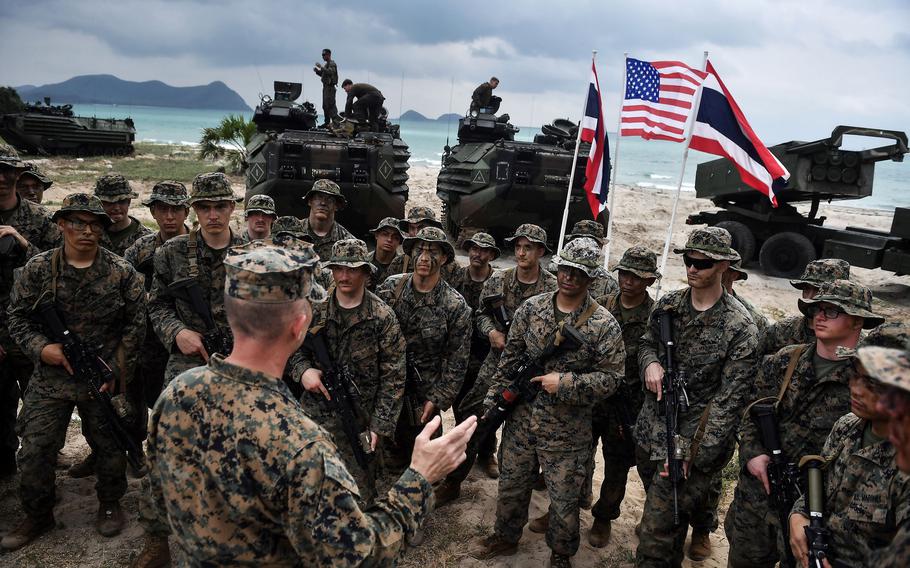
U.S. Marines gather after exercises in the coastal Thai province of Rayong in February 2020. (Lillian Suwanrumpha/AFP/Getty Images/TNS)
WASHINGTON (Tribune News Service) — A bicameral and bipartisan bloc of 20 members of Congress is urging Armed Services leaders to write a final NDAA that provides more financial help for U.S. troops who have low incomes and often suffer food insecurity.
The group of lawmakers, in a Monday letter, called for an NDAA that rewrites the eligibility rules for the so-called basic needs allowance program. The coalition wants service members’ basic housing allowances to no longer count as income under the basic needs program.
Nearly 1 in 4 active-duty service members — or about 286,800 people, not counting their family members — are beset by food insecurity, according to the most recent Pentagon survey of the force. Of those, about 120,000 deal with “extreme food insecurity,” the department found.
But the basic needs allowance, which was created by the fiscal 2022 NDAA, is helping only about 2,400 troops — or just 0.8% of the 286,800 reportedly in need, CQ Roll Call disclosed in January, citing figures provided by the Defense Department.
The reason for the meager participation rates, the authors of Monday’s letter said, is that counting the housing allowance in service members’ incomes makes most needy military families ineligible.
“Our servicemembers are our military’s greatest resource,” they wrote. “When they experience hunger, we put our national security at risk.”
Influential signatories
The letter was led by Sen. Tammy Duckworth, D-Ill., and Rep. Jimmy Panetta, D-Calif. Two Republicans, Sen. Lisa Murkowski of Alaska and Rep. Cathy McMorris Rodgers of Washington state, are signatories.
Also signing the letter were Democratic Sens. Richard J. Durbin of Illinois, Patty Murray of Washington, Richard Blumenthal of Connecticut, Kirsten Gillibrand of New York, Cory Booker of New Jersey, Raphael Warnock of Georgia, Peter Welch of Vermont and John Fetterman of Pennsylvania plus Angus King of Maine, an independent who caucuses with Democrats.
The House Democratic signatories are Marilyn Strickland of Washington, Susan Wild of Pennsylvania, Jill N. Tokuda of Hawaii, Gwen Moore of Wisconsin, Sanford D. Bishop Jr. of Georgia, plus Mike Levin and Sara Jacobs of California.
The chair and ranking member of the House Armed Services Quality of Life Panel — Nebraska Republican Don Bacon and Pennsylvania Democrat Chrissy Houlahan, respectively — are on the record supporting the change but are not signatories to the letter.
Excluding the housing allowance from income calculations would result in 21 times as many military families receiving aid under the basic needs allowance, Rand Corp. said in a study earlier this year.
The House’s fiscal 2024 NDAA would for the second straight year drop the requirement to include housing payments as income under the program. But the Senate’s NDAA, for the second straight year, does not follow suit. And the Senate’s approach has become law so far.
The group of 20 lawmakers who wrote Armed Services leaders on Monday would like Congress to break that pattern and adopt the House-passed language.
“This common-sense adjustment to the eligibility guidelines for the BNA will help ensure the majority of military families who struggle with food insecurity are able to access this critical support,” the members wrote.
Military housing payments are not counted toward taxable income by the IRS and for most other federal programs, experts said.
Moreover, because the military’s housing allowances predominantly go to defray expenses for troops who live off base in privately run housing, not to service members who live on base, the basic needs allowance creates a disparity among service members by inflating the income calculation of those who live off base, some critics say.
Ineffective tweaks
Congress has slightly expanded the program in the last couple of NDAAs, but the changes do not appear to have made much if any difference in participation rates
As initially written in the fiscal 2022 law, the basic needs allowance aimed to ensure no service member’s salary would fall below 130% of the poverty line.
Since then, Congress has upped the target to 150% the poverty line and has allowed service secretaries to go as high as 200% in some cases.
Current law permits the armed services’ secretaries to remove the housing allowances from eligibility determinations for a service member who lives somewhere with a “high cost of living.”
The Senate’s fiscal 2024 NDAA would also allow the secretary to issue such a waiver for a person in uniform who “otherwise has a demonstrated need.”
The bloc of lawmakers who wrote Armed Services leaders Monday prefer a more sweeping and direct approach.
Eliminating the housing allowance from income calculations under the basic needs program is supported by groups such as the National Military Family Association and MAZON: A Jewish Response to Hunger.
The cost of the program, which was $12 million in fiscal 2023, is .001% of the annual defense budget.
CQ-Roll Call, Inc.
Visit cqrollcall.com.
Distributed by Tribune Content Agency, LLC.